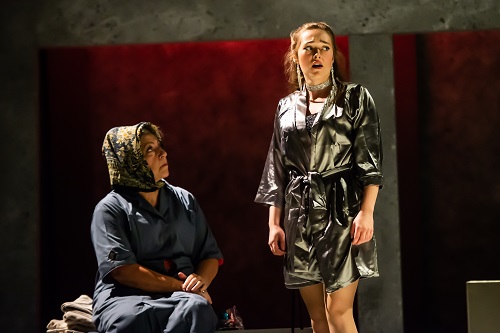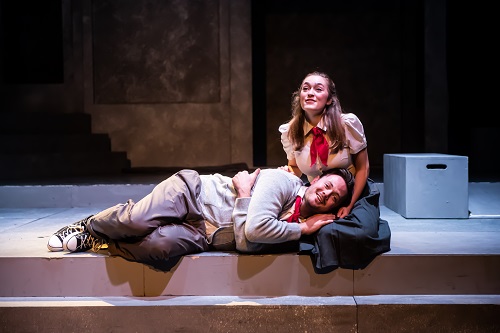Bernstein’s Candide has been through innumerable versions since the work’s disastrous premiere on Broadway in 1956, and in many ways, it remains a sequence of songs in search of a plot with each iteration of the work taking a slightly different view. But musically there are variations too: there is a world of a difference between the sound-world of the 1950s original with its Broadway theatre orchestra and the Mahlerian luxuriance of the finale of Bernstein’s recording with the London Symphony Orchestra in 1989. And the work is now performed as a theatre piece, with miked actors, and as an operetta with opera singers.
The work had something of a further reinvention at Blackheath Halls as Sebastian Harcombe directed Bernstein’s Candide for Blackheath Halls Opera, a community enterprise that brings together members of the community, professional opera singers, production team and students from Trinity Laban Conservatoire. The cast was led by Nick Pritchard as Candide, with Frederick Long as Dr Pangloss, Ellie Neate as Cunegonde, Sarah Pring as the Old Lady, James Liu as the Governor, Matthew Kellett as Maximilian plus Hannah Leggatt and Adam Brown, with the Blackheath Halls Chorus, Blackheath Halls Orchestra, Blackheath Halls Youth Opera Company and students from Greenvale School and Charlton Park Academy, all conducted by Christopher Stark. Designs were by Elliott Squire, lighting by Tracey Gibbs, movement by Jasmine Ricketts.
The result was a remarkable achievement. Not only is Candide a long and musically tricky work but it is theatrically complex, with eight or nine different costume changes for the chorus, and a far greater number of performers on stage than Bernstein might ever have expected. But behind this there was also the logistics of bringing together the professional singers and the students, with the non-professional chorus and orchestra, the youth chorus and the young people from the special needs schools, each group requiring a different schedule of rehearsal. So, bringing the production together in the first place was a triumph, but it was also a very theatrically satisfying evening and Sebastian Harcombe’s production made wonderfully imaginative and creative use of the resources at his disposal.

The action was transferred to the late 20th century, beginning in East Germany in the 1989. From then on there were a picaresque series of adventures in and around Europe, including a cruise-liner run by a religious cult, with the Auto-da-Fe scene transformed into a kinky club in Berlin. The dialogue was cut to the bone (thankfully) and a number of extra scenes were inserted, played generally in dumb-show over Bernstein’s orchestra entractes, and any extra information needed was projected as text onto the set.
This worked remarkably well. We had, essentially, a series of tableaux with less worry about connective tissue, transforming the comic morality into something of a picaresque journey, Tristram Shandy-like, as Candide and Cunegonde grew up and learned about themselves. What Harcombe’s transformation did was minimise the original’s use of co-incidence and unlikelihood (Candide’s first vision of Cunegonde dead was played as a dream); also, as the work progressed the Panglossian element gradually evaporated. And by collating Martin with Pangloss, in the final scenes, Harcombe gave us a Pangloss similarly transformed by events, moving from ridiculous optimism at the opening to extreme pessimism.
Not everything worked, and Harcombe could not disguise that the Eldorado scene is perhaps the weakest, coming at a point in Act Two when the action seems to flag. But things recovered in the casino and the final scene was profoundly moving. The final chorus, ‘Let our garden grow’, took on a lovely extra meaning when you considered all the young (and not so young) people having a new engagement with opera and hopefully Blackheath Halls Opera’s garden will grow too.
It helped that in Nick Pritchard there was an engaging and beautifully considered Candide. He was less priggish than usual, and Pritchard combined an involving stage presence with perhaps the best sung account of the role that I have come across. Pritchard’s Candide really developed in emotional weight, so that the ending when he loses hope was profoundly moving.

Ellie Neate’s Cunegonde was on an equal level. She was not quite as dementedly self-centred as usual and besides a dazzling account of ‘Glitter and be gay’ there were plenty of other musical moments to admire. The final duet with Pritchard was touching indeed, as the two characters came back from rock bottom.
Frederick Long made a youthful Pangloss, charming and a bit feckless, whose optimism gradually subsides as he rather loses his way. Sarah Pring was a very glamorous Old Lady, having the time of her life singing and dancing in ‘I am easily assimilated’, and elsewhere bringing charm and a wry humour to what is admittedly a gift of a role. Matthew Kellett was Maximilian, too handsome for his own good and this Maximilian was decidedly gay in the modern sense, with Kellett managing to rock both a sarong and full leathers. And he sings beautifully too.
James Liu was a decidedly scary Governor (here the Commodore of the cruise ship), whilst Hannah Leggatt-McPhee and Adam Brown supplied the remaining roles. Leggatt-McPhee’s Paquette popped up in a variety of unlikely guises whilst Adam Brown had at least four different incarnations, and both impressed with the dramatic dexterity whilst making strong musical contributions.
Elliott Squire’s simple but imaginative set provided a series of neutral settings for the riotous action, whilst facilitating the entrances and exits of a large chorus. That chorus entered into the whole with a will. The set pieces, notably the club-land Auto-da-Fe and the Old Lady’s ‘I am easily assimilated’, were wonderfully full of colour and movement, with the staging using the various talents available. We not only had nubile dancers, but the ability to provide small solo ensembles within the choruses, yet everyone’s enjoyment was palpable. In some scenes, smaller groups were used and for the opening scene we just had soloists and the youth chorus to good effect.
The orchestra similarly impressed. There are a lot of notes in this score, all those entr’actes and under-scores as well as the formal numbers. Not to mention that tricky overture. This latter was attacked with robust gusto, bringing vibrant energy to the music. Throughout, conductor Christopher Stark kept things on a tight even keel, the complex ensemble numbers were impressively thought through and controlled. He also managed the difficult balancing act of allowing his players to produce an exuberantly vibrant performance whilst making sure that balance worked well.
This was a wonderfully vivid evening, the performers’ sheer exuberance never overwhelming the work. At the centre was Nick Pritchard’s touching Candide and Ellie Neate’s glittering Cunegonde, but these were surrounded with a strong group of soloists and performers who created a fine ensemble feel. You felt that everyone on stage, whether amateur or professional, was having a terrific time.
Robert Hugill
Leonard Bernstein: Candide
Candide – Nick Pritchard, Cunegonde – Ellie Neate, The Old Lady – Sarah Pring, Dr Pangloss – Frederick Long, Governor – James Liu, Maximillian – Matthew Kellett, Paquette – Hannah Leggatt, Vandedendur/Prince Ragotski/Don Domino/Captain – Adam Brown; Director – Sebastian Harcombe, Conductor – Christopher Stark, Blackheath Halls Chorus, Blackheath Halls Orchestra, Blackheath Halls Youth Opera Company, Students from Greenvale School and Charlton Park Academy
Blackheath Halls, London; Monday 27th September 2022.